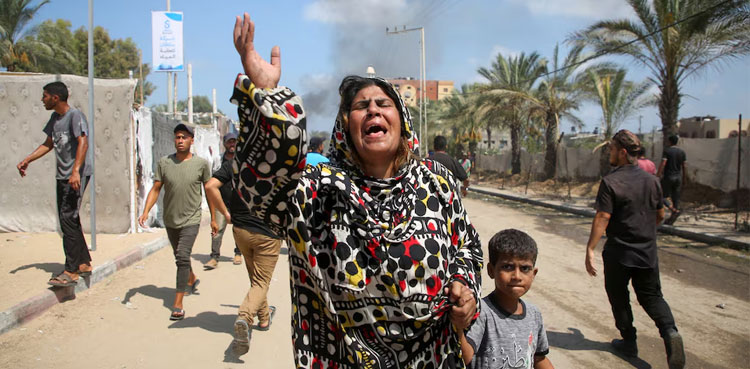
[ad_1]
Israeli airstrikes killed at least 16 Palestinians in Gaza on Monday and residents feared new air and ground attacks were aimed at emptying areas of civilians in the enclave’s north.
The U.N. Palestinian refugee agency UNRWA said Israel was scaling back the number of aid trucks allowed into Gaza, compounding shortages of food, medicine and other essential supplies, though Israel denied this.
In the latest bloodshed, several people were killed or wounded in a strike on northern Gaza’s Beit Lahiya late on Monday, medics said, the same town where seven people were killed in an attack on two houses earlier in the day.
Another strike killed four people in Zawayda in the central Gaza Strip while five more were killed in separate strikes in central and southern parts of the enclave, medics told Reuters.
Several people were wounded in the attacks, they said, adding that Israeli forces had sent tanks into the northeast of Nuseirat camp earlier on Monday.
Israel deployed tanks into Jabalia, Beit Hanoun, and Beit Lahiya on Oct. 5, saying it intended to prevent Hamas fighters from regrouping.
The Palestinian Health Ministry said Israeli forces were continuing to bomb the Kamal Adwan Hospital and had injured many staff and patients.
“The medical staff cannot move between the hospital departments and cannot rescue their injured colleagues. It seems that a decision has been made to execute all the staff who refused to evacuate the hospital,” it said.
Israel’s military says it makes efforts to minimize harm to Gaza’s civilians as its troops battle Hamas fighters who use shelters and hospitals to stage attacks against its forces. Hamas denies this.
More than 70 patients and their guardians were safely evacuated from Kamal Adwan and Al-Awda hospitals to other medical facilities in Gaza, Israel said on Monday, while fuel, water and medical supplies were delivered to the hospitals.
Palestinians said the new offensives and orders for people to leave were aimed at emptying two northern Gaza towns and a refugee camp to create buffer zones. Israel says it is trying to keep civilians out of harm’s way as it fights Hamas there.
The Hamas-run Gaza government media office put the number of Palestinians killed since Oct. 5 at 1,800. It said 4,000 others were wounded.
More than 43,300 Palestinians have been killed in more than a year of war in Gaza, according to Gaza authorities, and much of the territory has been reduced to ruins.
The war erupted after Hamas-led fighters attacked Israel on Oct. 7, 2023, killing some 1,200 people and taking 251 hostages back to Gaza, according to Israeli tallies.
‘UNSPEAKABLE SUFFERING’
UNRWA head Philippe Lazzarini said on Monday that Israel has scaled back the entry of aid trucks into the Gaza Strip to an average of 30 trucks a day, the lowest in a long time. This represented only 6% of the commercial and humanitarian supplies that used to enter Gaza before the war, he said.
“This cannot meet the needs of 2 million people, many of whom are starving, sick, and in desperate conditions,” Lazzarini said on X.
An Israeli government spokesman said no limit had been imposed on aid entering Gaza, with 47 aid trucks entering northern Gaza on Sunday alone.
Israeli statistics reviewed by Reuters last week showed that aid shipments allowed into Gaza in October remained at their lowest levels since October 2023.
Earlier on Monday, Israel’s foreign ministry said it had officially notified the United Nations it was cancelling the agreement that regulated its relations with UNRWA since 1967 – effectively banning it – as it seeks the help of other U.N. agencies in getting aid to Gaza.
“Restricting humanitarian access and at the same time dismantling UNRWA will add an additional layer of suffering to already unspeakable suffering,” Lazzarini said.
The U.N. said in August that nine UNRWA staff may have been involved in the Oct. 7 attack on Israel and had been fired. Later, a Hamas commander in Lebanon – killed in an Israeli strike – was found to have had an UNRWA job.
[ad_2]
Source link





